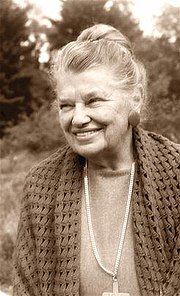Thus, I won't have a lunch break until January 3.
Thus, I won't be blogging until at least January 3.
So, I'll have to include not only today's installment of the Chesterton Advent Calendar (explanation here) but also those for Christmas Eve and Christmas Day as well.
23 December
Fortunately, however, being happy is not so important as having a jolly time. Philosophers are happy; saints have a jolly time. The important thing in life is not to keep a steady system of pleasure and composure (which can be done quite well by hardening one's heart or thickening one's head), but to keep alive in oneself the immortal power of astonishment and laughter, and a kind of young reverence. This is why religion always insists on special days like Christmas, while philosophy always tends to despise them. Religion is interested not in whether a man is happy, but whether he is still alive, whether he can still react in a normal way to new things, whether he blinks in a blinding light or laughs when he is tickled. That is the best of Christmas, that it is a startling and disturbing happiness; it is an uncomfortable comfort. The Christmas customs destroy the human habits. And while customs are generally unselfish, habits are nearly always selfish. The object of the religious festival is, as I have said, to find out if a happy man is still alive. A man can smile when he is dead. Composure, resignation, and the most exquisite goo dmanners are, so to speak, the strong points of corpses. There is only one way in which you can test his real vitality, and that is by a special festival. Explode cracker in his ear, and see if he jumps. Prick him with holly, and see if he feels it. If not, he is dead, or, as he would put it, is "living the higher life." —Illustrated London News, 1908
24 December
Almighty God to all mankind on Christmas Day said He:
"I rent you from the old red hills and, rending made you free.
There was charter, there was challenge; in a blast of breath I gave;
You can be all things other; you cannot be a slave.
You shall be tired and tolerant of fancies as they fade,
But if men doubt the Charter, ye shall call on the Crusade –
Trumpet and torch and catapult, cannon and bow and blade,
Because it was My challenge to all the things I made." —A Christmas Song for Three Guilds
25 December
The Christ-child lay on Mary’s lap,
His hair was like a light.
(O weary, weary were the world,
But here is all aright.)
The Christ-child lay on Mary’s breast
His hair was like a star.
(O stern and cunning are the kings,
But here the true hearts are.)
The Christ-child lay on Mary’s heart,
His hair was like a fire.
(O weary, weary is the world,
But here the world’s desire.)
The Christ-child stood on Mary’s knee,
His hair was like a crown,
And all the flowers looked up at Him,
And all the stars looked down —A Christmas Carol






